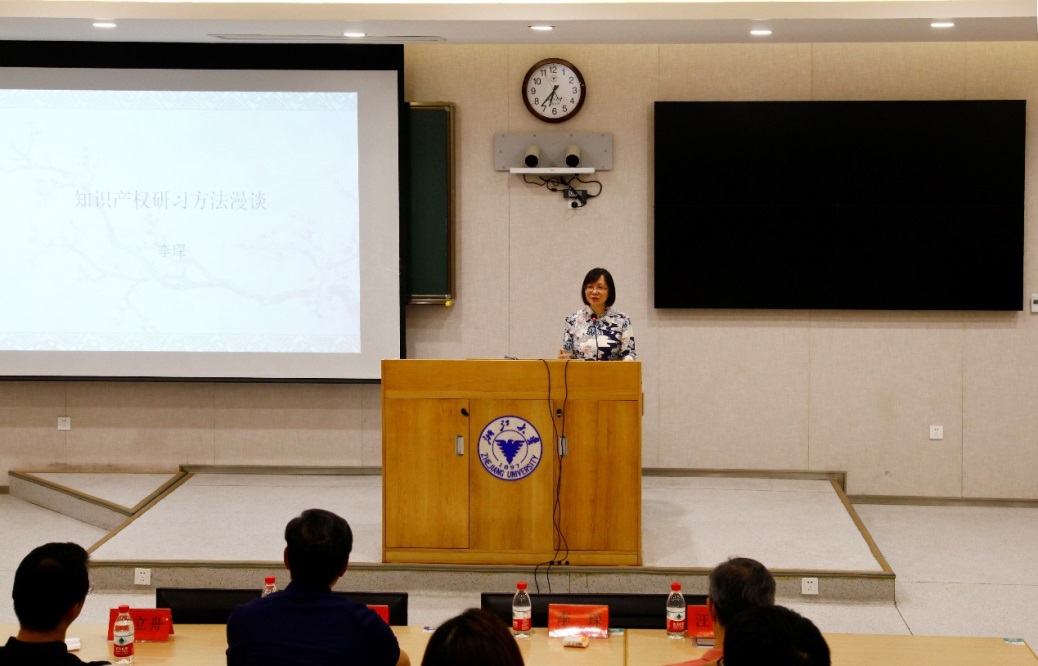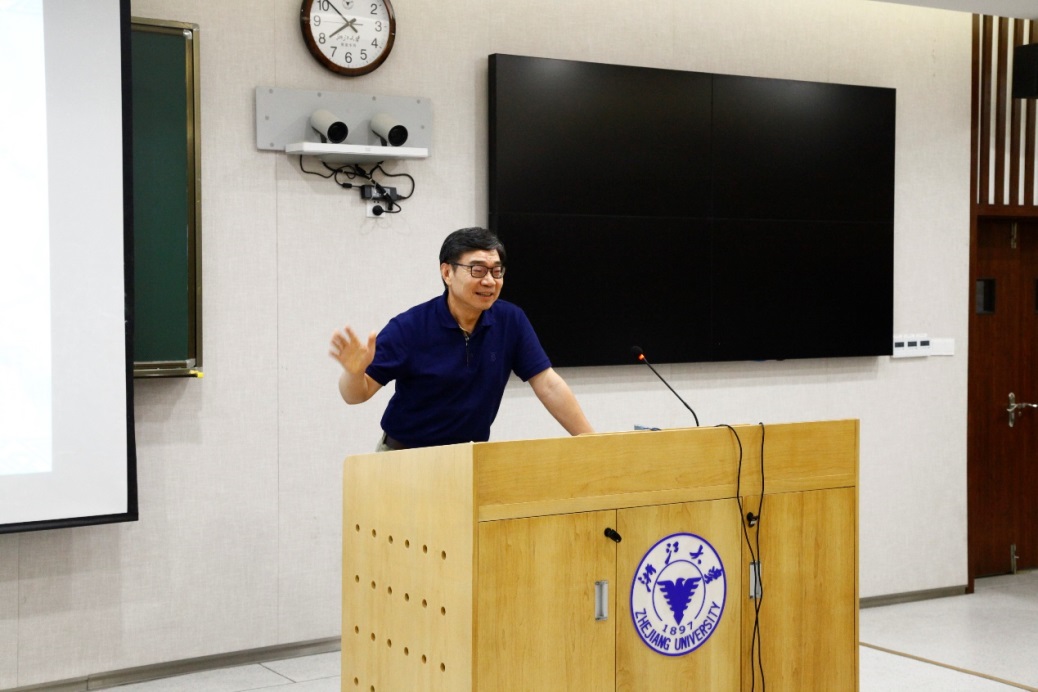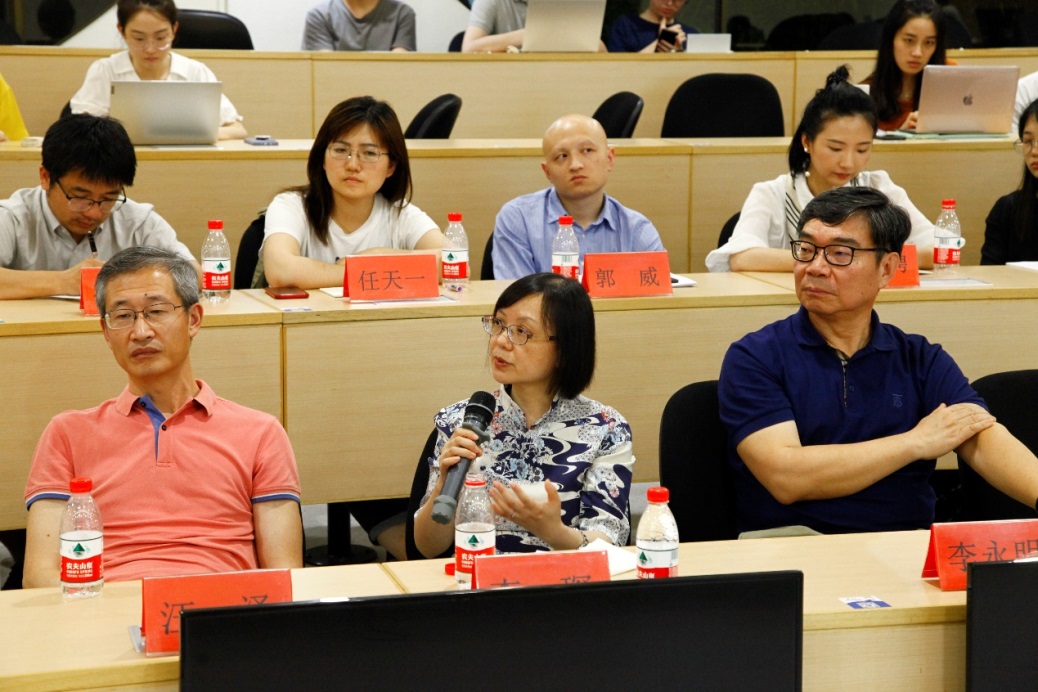- Delegation from the University of Ottawa visits Guanghua Law School2025-11-14
- Due Diligence Obligations and Marine Environmental Protection — Report on the 10th Session of the 2025 International Law and Foreign-related Rule of Law Salon2025-10-28
- Professor James Harrison from the University of Edinburgh Law School Visits Guanghua Law School2025-10-28
On the evening of May 27, 2021, Intellectual Property Salon and Frontier Law Lecture of 2021 was successfully held Zhijiang Campus.
Prof. Li Chen from Renmin University of China, gave a lecture on “A Casual Discussion on Methods of Intellectual Property Study,” sharing methodological issues in the study of intellectual property. Prof. Li Yongming was invited to participate in the discussion. Dr. Wei Lizhou presided over the lecture. The lecture also attracted many young intellectual property scholars from other universities in the province, and it received a warm response on site.

Prof. Li first proposed two major tasks that are inevitably faced in the study, research, and practice of law: (1) how to discern and choose a position when confronted with various conflicting views and plans; (2) how to provide a rational explanation for one’s own position.
Responding to these two major tasks is the two types of abilities we should acquire in the study, research, and practice of law. Subsequently, Prof. Li combined some examples of intellectual property to discuss this topic in depth.
Firstly, regarding the selection of a position, Prof. Li offered several guidelines. First of all, the interpretation of legal concepts must have normative significance. Prof。 Li pointed out that concepts are descriptions of the essential attributes of things, and what constitutes “essence” should be determined in conjunction with the purpose of establishing the concept. Legal concepts carry a normative function, and their interpretation should therefore have normative significance. In some conceptual disputes, it may seem that multiple interpretations can be self-consistent, but some interpretations can cause the concept to lose its normative significance, making such interpretations unacceptable. Secondly, the interpretation of law must be in accordance with its normative purpose. In disputes involving the interpretation of law, it is necessary to explore the normative purpose of the provision to avoid directional errors in interpretation. Lastly, in the ambiguous areas of factual judgment, it is necessary to explore the value orientation of concepts and norms. When assessing the nature of a factual object and encountering ambiguity, delving into the value tendencies that are specifically intended by the relevant concepts or rules can assist in making a determination.
Regarding the methods of explaining a position, Prof. Li offered the following suggestions. First, it is essential to appeal to concepts, principles, and logic. Emphasizing the importance of legal concepts, Professor Li noted that the core of professional learning is to grasp and apply the language of the discipline. The practical focus of law should not serve as an excuse for disregarding logic and concepts. Discussions on practical issues should not rely solely on industrial interests; instead, considerations of interest should be rationally explained with the aid of concepts and principles.Second, in legal interpretation, one should strive to realize value based on the text. In difficult cases, legal interpretation should follow the path of prioritizing the literal meaning, reducing to value, and relying on the text, providing textual basis while taking into account the normative purpose, and not blurring the boundaries between the judiciary and legislation. Third, one should not discuss rules in isolation. Rules can only serve as corroborating evidence; it is necessary to explore the rationale behind the rules. Law students often mistake the mere accumulation of legal provisions for "comparative research" in their papers, which is not advisable.

Lastly, Prof. Li offered the following four more specific suggestions for the students’ learning:
1. When studying concepts, one should seek to understand the normative purpose and not be confined to the literal interpretation of phrases.
2. Cultivate the ability to create definitions and use concepts to explain phenomena and viewpoints.
3. Pay attention to flexible expressions in legislation for future interpretive needs.
4. Use comparative studies correctly and not merely play with terminology.
In the discussion segment, Prof. Li shared his perspectives in response to Prof. Li’s remarks. As intellectual property becomes increasingly popular and gradually emerges as a prominent field of study, when analyzing some of the hot topics in intellectual property, we should return to fundamental theoretical research and adhere to the academic original intention of those in the field of intellectual property.

Finally, Dr. Wei, the moderator of the lecture, summarized the lecture based on the speeches of Prof. Li and Prof. Li. Dr. Wei offered his own views on the “cutting-edge” and “foundation” of legal research. He pointed out that the cutting-edge nature of academic research is not only about discussing current hot topics, but also about uncovering deep-level issues in basic research, which may even have more enduring value.
The nearly three-hour lecture came to a successful conclusion with a rich and warm atmosphere, from which the scholars and students present greatly benefited. Special thanks go to Prof. Li for her wonderful sharing, and to all the young scholars and students for their active participation. We look forward to the future intellectual property salons being even better.

